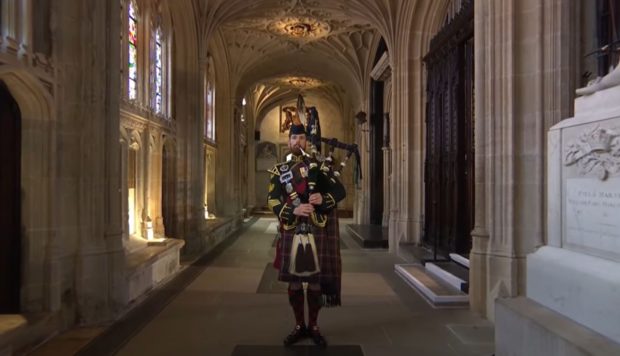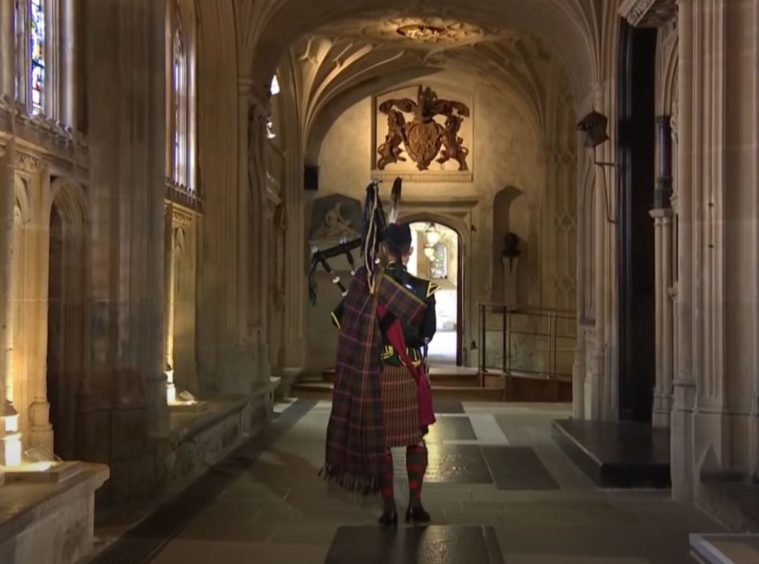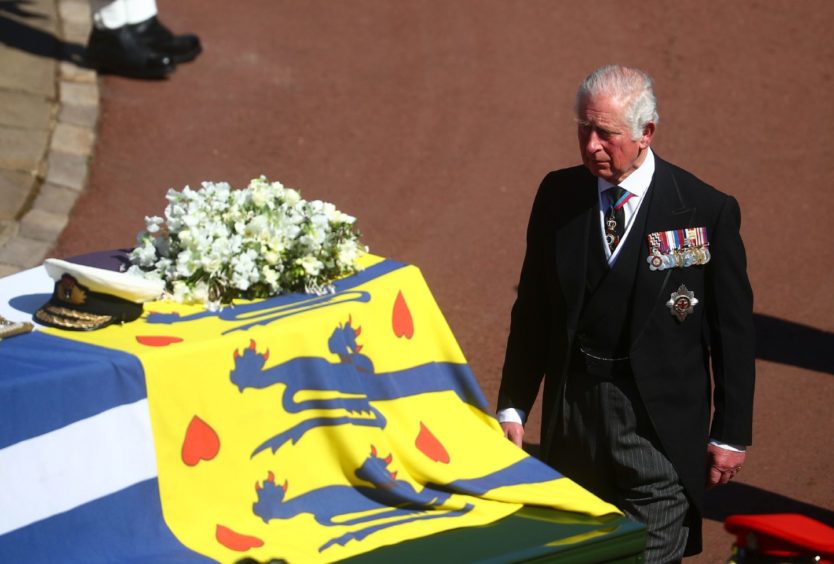For one poignant moment during the funeral of Prince Philip, the eyes of the world turned to lone piper Peter Grant.
It was the last, and most emotional, time he played for the duke.
The country has been in national mourning since Prince Philip’s death on April 9, with union flags flown at half-mast across the UK for more than a week.
And as the Queen’s husband of 73 years was laid to rest in Windsor on Saturday, it was a Braemar piper who played the lament just yards from the flag-draped coffin, and the grieving widow.
Pipe Major Colour Sergeant Peter Grant, of the 4th Battalion, The Royal Regiment of Scotland (4 Scots), played Flooers o’ the Forest down the hall of the chapel, a role he was all-too-aware could fall upon him when he took up his post one year ago.
“It was being watched worldwide”
“Prince Philip was the Colonel in Chief of the Highlanders before we amalgamated and he became the Royal Colonel of 4 Scots,” Pipe Major Grant said.
“He has always been affiliated with our regiment.
“I always knew it was something I was going to do, it’s a role that is handed down between pipe majors of 4 Scots.
“All the pipe majors in 4 Scots know that if the Duke of Edinburgh was to pass away, we would be the ones playing at this funeral, so I always knew it could fall to me.
“Prior to playing there was a lot of pressure. It was being watched worldwide, but it was more of an emotional feeling for myself. I did feel really emotional in the chapel.
“I was glad, more than anything, that we put on a good funeral for him.”
Troops from the Catterick-based batallion, known as the Highlanders, played a key role in proceedings in and around Windsor Castle, with kilted soldiers making up part of the street lining party and colour party too.
They deployed to Windsor on Monday, just days after the Duke’s death, to begin drill training at Pirbright camp.
Pipe Major Grant, meanwhile, spent the five days leading up to the funeral taking part in rehearsals at St George’s Chapel.
He added: “I had actually just driven home to Braemar and was at home on the Friday when news of the duke’s death broke.
“I drove straight back down to Catterick to begin preparations with things like fittings to be taken care of with the master tailor.”
The Royal Deeside connection
No stranger to royal company, the 33-year-old former member of Ballater and District Pipe Band has brushed shoulders with the monarchy on previous occasions both through his 15 years in the Highlanders and his hometown’s connection to the family.
“You can ask anyone in Braemar and they’ll say they often see the royals driving through town,” he added.
“You would often see them and when I joined the Army I met them on several occasions. The last time I played for the duke was with the band at Buckingham Palace in 2019.
“I’ve played for the royals with the band but this was my first big-scale solo job for them. It was a lot of pressure. I really just wanted to do a good job for his family.
“I know that my village will be feeling proud that a local lad who played at the Highland Gathering played at his funeral.”
Last year the musician gave a solo performance to mark what should have been the Braemar Gathering in Ballater for Prince Charles, the Duke of Rothesay.
But piping the lament Flooers o’ the Forest, usually heard annually on Armistice Day and Remembrance Sunday, was a particularly proud moment for not just himself, but his family and colleagues too.
“With all the build up and rehearsals it was emotional for everyone involved in the day,” he added.
“Playing that lament was extremely emotional. My family are very proud and I think everyone in the military that knows me was really proud as well.
“I’ve had a lot of great comments about how it went so I obviously played well…which is a relief.
“The main thing was to do a good job for the Royal Family. It was a day for them to mourn the duke and for the Queen to say goodbye to her husband.”
After almost 70 years as head of state, the Queen must now reign without her husband by her side.
She sat on her own during the funeral service, which reflected Prince Philip’s life-long support of the armed forces, having had a close connection with the Navy for more than 80 years.
A strong bond between Duke and Scots
After leaving the Royal Navy, he became Colonel-in-Chief of the Queen’s Own Cameron Highlanders in 1953, before a series of amalgamations saw the eventual creation of the Scots in 2006.
As this unit became the senior line infantry regiment of the British Army, the Queen took on the role of Colonel-in-Chief, with The Duke of Edinburgh serving as Royal Colonel to 4 Scots.
On Saturday, his coffin was draped with his personal standard, featuring his Admiral of the Fleet naval cap and sword next to a wreath of white flowers chosen by the Queen with a handwritten card from his wife of 73 years.
Prince Philip was the guiding force behind the preparations for his funeral, which was pared back because of Covid restrictions, with guests reduced from around 800 to 30 and the public elements cancelled.
Prince Charles was joined by the Princess Royal, Duke of York and Earl of Wessex as they walked behind Philip’s coffin – which was carried by a Land Rover Defender hearse he helped design – during the funeral procession.
At 3pm on Saturday the nation came to a halt to observe a minute’s silence in memory of the duke who died a few months short of his 100th birthday.
In a moment never seen before on television, the duke’s coffin was slowly lowered into the royal vault as his titles were read out at the end of the service.


